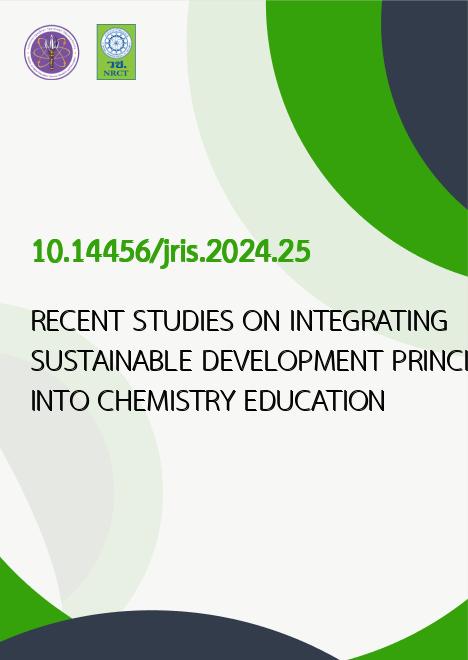
|
RECENT STUDIES ON INTEGRATING SUSTAINABLE DEVELOPMENT PRINCIPLES INTO CHEMISTRY EDUCATION |
|---|---|
| รหัสดีโอไอ | |
| Creator | Natdanai Nirutmeteekul |
| Title | RECENT STUDIES ON INTEGRATING SUSTAINABLE DEVELOPMENT PRINCIPLES INTO CHEMISTRY EDUCATION |
| Contributor | Sara Samiphak |
| Publisher | ห้างหุ้นส่วนจำกัด นวัตกรรมการเรียนรู้สร้างสรรค์ |
| Publication Year | 2567 |
| Journal Title | Journal of Research and Innovation for Sustainability (JRIS) |
| Journal Vol. | 1 |
| Journal No. | 7 |
| Page no. | 1-9 |
| Keyword | sustainable development principles;chemistry education;recent studies |
| URL Website | https://so17.tci-thaijo.org/index.php/JRIS |
| Website title | Journal of Research and Innovation for Sustainability |
| ISSN | 3056-9397 |
| Abstract | This study examined current research on the integrating sustainable development principles into chemistry education published in the Journal of Chemical Education between 2019 and 2023. The researchers employed a systematic literature review to select, categorize, and analyze content based on the study's findings, including the researcher's nation, target audience, and content focus. The findings were analyzed using descriptive statistics such as means and percentages. The study revealed that European countries, particularly the United Kingdom, published the most research. The research focused mostly on students. The content focus was divided into three topics that integrate the principles of sustainable development (SD): 1) Curriculum, with the major focus on fostering 1.1) awareness and social responsibility related to climate change, pollution, and sustainable use of natural resources, 1.2) critical thinking abilities, evaluating evidence, and developing conclusions on societal issues related to sustainable development, 1.3) problem-solving through creative thinking, collaboration, and initiative in discovering solutions for sustainable development. 2) Learning activities that emphasized 2.1) hands-on learning through experiments and projects, and 2.2) participation by encouraging thinking, questioning, and cultivating curiosity, 3) Assessment for learning, which evaluated students' abilities to apply concepts in real-world circumstances and analyze long-term sustainable behaviors. |
